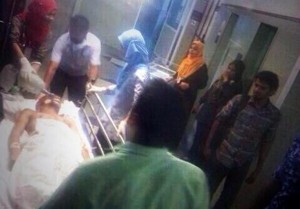An inmate who suffered serious head injuries in a prison fight at Maafushi jail last month requested to be transferred from his cell more than an hour before the assault, according to a one-page report shared by the Maldives Correctional Services (MCS) with parliament’s government oversight committee.
On February 24, Prison Corporal Mohamed Mujthaba, the ranking duty officer at the time of the incident, was informed by guards of unrest in cell number 12 of unit three, wing one, at about 5:25pm, stated the report read out by MCS Lawyer Mohamed Zahir at yesterday’s committee meeting.
Mujthaba questioned the prisoners and was asked by two of the three inmates in cell 12 – Ali Ashwan of Ma. Oasis Villa and Ibrahim Azar of M.Dhodhilige – to be transferred to a different cell.
“However, when [the inmates] were asked to explain the reason for wanting to change cells, they refused to do so until they were taken out of the cell,” the report revealed.
At about 6:00pm, the report stated, instructions were given by Prison Corporal Ali Maaniu, deputy head of the operation and security department, to transfer the inmates.
However, the third inmate in cell 12 – Ahmed Liushan, also from Ma. Oasis Villa – obstructed prison guards who attempted to take the other inmates out of the cell.
Duty-in-charge Corporal Mujthaba then made arrangements to transfer the inmates with the assistance of officers from the Emergency Support Group (ESG).
At about 6:50pm, Mujthaba and the ESG officers made their way to the cell upon hearing a commotion from the unit.
“When they opened the cell and looked inside, Ibrahim Azar was severely beaten. A lot of blood was flowing out of Ibrahim Azar’s head at the time. [Azar] indicated with gestures to the officers that he was assaulted by Ahmed Liushan. In addition, some officers saw Ahmed Liushan attacking Ibrahim Azar when they opened the cell,” the report stated.
The injured inmate was first treated by nurses at the Maafushi jail reception area before being taken to the Maafushi Health Centre.
 A doctor at the health centre advised that the inmate be immediately taken to Malé after completing medical procedures, the report continued, whereupon he was sent to Malé on a speedboat with three prison officers and two nurses at around 7:45pm.
A doctor at the health centre advised that the inmate be immediately taken to Malé after completing medical procedures, the report continued, whereupon he was sent to Malé on a speedboat with three prison officers and two nurses at around 7:45pm.
The other two inmates in cell 12 were meanwhile kept separately in holding cells for the investigation of the assault.
Commissioner of Prisons Moosa Azim was informed of the incident at 7:02pm, the report stated, whilst the assault was reported to the Maafushi police station at 8:03pm.
A police team began investigating the case shortly thereafter, took witness statements and sought forensic evidence.
Azar meanwhile underwent surgery at the Indira Gandhi Memorial Hospital (IGMH) for multiple injuries to his skull and remains in a coma under intensive care. He had been serving a five year sentence for drug abuse.
“Relevant” officials
Opposition Maldivian Democratic Party MPs on the committee meanwhile contended that prison officers were culpable in the incident as the inmates had been left unsupervised for more than 50 minutes.
Although Home Minister Umar Naseer and Commissioner of Prisons Moosa Azim were told to appear before the oversight committee yesterday, neither attended the meeting.
While Deputy Commissioner of Prisons Hassan Zilal and Superintendent Ibrahim Mohamed were sent in their place, both senior prison officials were unable to answer questions posed by MPs, citing lack of information.
The deputy commissioner informed MPs that he had been on the job for just two weeks and was yet to be given operational responsibilities. Zilal said he was not in Maafushi on the day in question.
Both officials suggested that MPs summon “relevant persons” to clarify details of the incident. Ibrahim Mohamed however revealed that doctors at IGMH had advised MCS that Azar should be flown overseas for medical treatment.